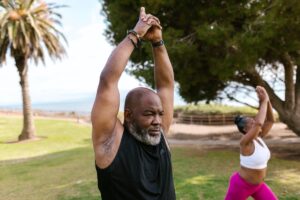
When it comes to life expectancy, it’s often said that age is just a number.
But could it really be true? In today’s society, many people are living longer and healthier lives than ever before. As a result, the idea of what it means to be “old” has shifted. Today, 60 really can be the new 40.
There are many reasons why this is the case. One of the most important reasons for an increase in life expectancy is advancements in quality healthcare.
With better access to medical care, people are able to stay healthy for longer, contributing to a longer life expectancy. Additionally, there is greater awareness of healthy lifestyle choices such as exercise and diet which can help reduce the risk of illness.
In addition, technology has made it easier for people to stay connected with others no matter their physical location or age.
This sense of connectivity helps older adults maintain an active social life which in turn leads to improved quality of life and overall well-being. And this contributes to a longer life expectancy.
Ultimately, while age may still be a number on paper, our perceptions of what it means to grow old are changing rapidly.
Thanks to the following factors, life expectancy is on the rise:
Health and Fitness Is More Important Than Ever To Many
It’s not uncommon to see people in their 50s, 60s, 70s, and even beyond leading active lifestyles and looking as youthful as ever.
One of the key factors contributing to this trend that extends our life expectancy is a growing emphasis on health and fitness among older adults.
More and more middle-aged adults and seniors are adopting  healthy lifestyle habits such as regular exercise, proper nutrition, stress management techniques, and getting adequate sleep.
healthy lifestyle habits such as regular exercise, proper nutrition, stress management techniques, and getting adequate sleep.
These habits can help reduce the risk of chronic diseases like heart disease, diabetes, arthritis, obesity and cancer, leading to a longer life expectancy.
In addition, staying active can also improve mental health by reducing stress levels and promoting cognitive function.
Regular exercise has been shown to boost brain power by increasing blood flow to the brain and stimulating the growth of new brain cells.
So if you’re at or approaching your so-called “golden years,” it’s never too late to start focusing on your health and fitness goals to enhance your quality life expectancy!
3 Quick Tips for Better Health and Fitness
- Exercising regularly helps to maintain muscle mass and bone density, which can decrease with age. It also reduces the risk of chronic illnesses such as heart disease and diabetes. Engaging in physical activity doesn’t have to be strenuous; a simple brisk walk or yoga class can suffice.
- Eating a balanced diet consisting of fruits, vegetables, whole grains, lean proteins, and healthy fats provides the body with essential nutrients needed for optimal health.The older you get, the less “heavy” food you need. An extended life expectancy often depends on eating the “right” foods at the correct proportions.There are valid reasons why restaurants often promote “senior servings” or early eating times, and instead of being offended, thank them!They are just trying to do their part to help us live our best life!
- Additionally, getting enough sleep is crucial for proper brain function and emotional well-being.The key with sleep is to find the right balance, and not go the other way either, which is sleeping for too many hours and wasting another day of life you were given!
Lifelong Learning Can Help Extend Your Life Expectancy
One of the most significant career advancements to consider is continuing your education.
That education can come whether you are still in the workforce, or simply want to learn new skills.
Many older works used to be hesitant with returning to school, for either credit or non-credit (continuing education) options, due to worries about being the “oldest” student in the class.
However, high-caliber online courses and certificate programs from top universities has greatly diffused those concerns.
In addition, flexible schedules and individual-pace options has made learning achievable for any age group.
In addition to the satisfaction of learning something new, keeping up with changes in the marketplace can provide a competitive edge in the job market.
Additionally, some companies offer tuition reimbursement or professional development funds for employees who wish to pursue further education, regardless of the stage of your career or ultimate retirement goals.
Networking is Always in Vogue
If you’re not ready to retire and want to continue up the career ladder, another way to advance your career is by networking.
Building relationships with colleagues, industry professionals, and hiring managers can open doors for new job opportunities or promotions within your current company.
Social media platforms like LinkedIn provide an easy way to connect with others in your industry and stay up-to-date on relevant news and trends.
It is important to remember that your age should not be a limiting factor when it comes to career advancement opportunities, and your value depends on your ability to do the job well and not on how old you are.
Many employers value experience over youth and actively seek out older workers for their knowledge and expertise.
While experience has always been valued, the changing dynamics of the marketplace, and a higher turnover of younger employees has made those who will stick with a company even more valuable.
If you feel that you have more to contribute professionally but are concerned about ageism in the workplace, consider seeking out organizations that promote diversity in hiring practices or starting your own business venture where you can use your skills and experience to succeed on your own terms.
Opportunities for Older Workers
Gone are the days when retirement at 60 was the norm. With increasing life expectancy and better health awareness, many age 60+ workers aren’t even considering leaving the workforce anytime soon.
This means that older workers have more opportunities to continue working well into their golden years.
One of these opportunities is entrepreneurship. Older workers may have accumulated years of experience and expertise in their respective fields, which can come in handy when starting a business.
They also have a better understanding of market trends and consumer behavior, making them valuable assets to any startup or small business.
Another opportunity for older workers is freelancing or consulting. Many companies are willing to hire experienced professionals on a project basis rather than full-time employment.
This allows older workers to work on projects they enjoy while still having time for other passions or hobbies outside of work.
Additionally, freelancing or consulting can provide flexibility in terms of working hours and location, allowing older workers to balance work with family obligations or travel plans.
Fulfilling work, at any age, is attributed to help increase a person’s potential for a longer life expectancy!
Social Life and Life Expectancy
As we age, our social life changes. But does that mean it has to slow down? Absolutely not! In fact, research shows that people over 60 are more social and engaged than ever before.
With more free time and fewer responsibilities, seniors have the opportunity to explore new hobbies, meet like-minded individuals and develop meaningful relationships.
From joining a book club or taking up dancing lessons to volunteering for community service projects or traveling with friends – there are many ways seniors can stay active and involved in their communities.
With the rise of technology, staying connected with loved ones near and far has never been easier. Social media platforms like Facebook, Instagram, Twitter and Snapchat allow seniors to communicate with family members and friends anytime they want.
So is age 60 really just another number?
It seems that way when it comes to maintaining an active social life! By embracing new experiences and staying connected with others, seniors can continue to live fulfilling lives well into their golden years.
Retirement vs. Staying Active
Retirement is commonly associated with relaxation and taking a break from the hustle and bustle of everyday life.
However, some people argue that age 60 is the new 40, meaning that individuals in their sixties are healthier and more active than previous generations.
As such, many retirees today prefer to stay active instead of retiring completely. All of that can relate to a longer life expectancy.
One reason for this trend is the increased awareness of healthy living and the benefits of exercise. Retirees today have access to more resources than ever before, including fitness classes designed specifically for seniors.
Additionally, many seniors are finding new hobbies or pursuing long-held interests now that they have more free time.
On the other hand, some retirees choose to fully embrace retirement as a time to relax and take a break from work.
For those who have worked hard throughout their lives, retirement can be seen as an opportunity to travel or spend quality time with family members.
Ultimately, whether one chooses to retire completely or remain active depends on personal preferences and circumstances. Despite this divide, it’s clear that there are plenty of opportunities available for those looking to stay active during their golden years.
Mental Well-Being Contributes to Longer Life Expectancy
Maintaining good mental well-being is essential to living a happy and fulfilling life, regardless of age. In fact, many experts believe that age 60 can be the new 40 when it comes to mental health.
This is because people are now able to lead longer and more active lives, with access to better healthcare and improved living standards.
However, mental health challenges can still arise as we age, such as depression and anxiety.
It is important for seniors to seek professional help if they experience these symptoms or any other changes in their mood or behavior.
Additionally, incorporating healthy habits into daily routines such as exercise, socializing with friends and family, and engaging in hobbies can greatly improve overall mental well-being.
While aging can come with its own set of challenges, maintaining a positive outlook on life by focusing on one’s mental health can make all the difference in how enjoyable those later years are experienced.
Staying Engaged and Stimulated
Staying engaged and stimulated is crucial at any age, but it becomes even more important as we age.
Many people feel like they will have a longer life expectancy because they feel like they have more energy and vitality than their parents or grandparents did at that age.
 Some of the ways to stay engaged and stimulated include pursuing hobbies and interests, staying physically active, socializing with friends and family, traveling, taking classes or learning new skills.
Some of the ways to stay engaged and stimulated include pursuing hobbies and interests, staying physically active, socializing with friends and family, traveling, taking classes or learning new skills.
One great way to stay engaged is by volunteering in your community. Volunteering not only helps you connect with others who share similar interests but also provides a sense of purpose and fulfillment. It can be very rewarding to know that you are making a difference in someone else’s life.
Another way to stay stimulated is by challenging yourself mentally. This could mean reading books on a variety of topics or playing brain-training games.
Engaging in stimulating conversations with people from different backgrounds can also help keep your mind sharp while exposing you to new ideas and perspectives.
Ultimately, staying engaged and stimulated throughout our lives helps us maintain our physical health as well as our mental wellbeing – regardless of our chronological age!
Financial Stability and Life Expectancy
With the increasing life expectancy and better healthcare facilities, age 60 is no longer considered old.
In fact, many people in their 60s are still working, enjoying an active lifestyle, and pursuing new interests. This has also given rise to a need for financial stability in the later years of life.
According to financial experts, planning for retirement should start early on in one’s career.
Starting small with regular savings can make a big difference over time. Investing wisely and regularly reviewing investments can also help build wealth for retirement.
In addition to building a solid financial foundation through savings and investments, it is important to have a plan for managing debt as well as unexpected expenses like medical bills or car repairs.
A good budgeting strategy that includes living within one’s means can help ensure financial stability throughout life regardless of age or income level.
By taking these steps towards financial security, age 60 truly can become the new 40 when it comes to maintaining a comfortable lifestyle after retirement.
Preparing for Retirement in Later Years
With people living longer than ever before, it’s no surprise that age 60 is being touted as the new 40. But how do you prepare for retirement in these later years?
First and foremost, it’s important to have a solid financial plan in place. This includes saving enough money to ensure that you can maintain your lifestyle without having to rely on Social Security or other government assistance.
In addition to financial planning, it’s also essential to focus on your overall health and well-being. This means staying active and engaged with your community through hobbies, social activities, and volunteering.
By maintaining a strong support system of friends and family, you’ll be better equipped to handle any challenges that may arise during retirement.
Finally, don’t forget about the importance of education and lifelong learning. Keep your mind sharp by taking classes or pursuing new interests that challenge you intellectually. With the right mindset and preparation, age 60 truly can be just as vibrant and fulfilling as age 40.
Life Expectancy Can Be What You Make It
Age is just a number and it’s up to us to decide how we want to interpret that number. The idea of aging has always been associated with a decline in health, mobility, and cognitive abilities but as times change so do the perceptions about age.
People are living longer and healthier lives than ever before, thanks to advancements in medical technology, better access to healthcare resources, and an increased focus on healthy living.
Even though aging is inevitable, there are things that we can do to improve our quality of life as we get older.
Eating a balanced diet rich in nutrients, eliminating harmful habits such as smoking or excessive alcohol consumption, getting regular exercise and staying socially connected can all help improve overall health and mental wellbeing.
Overall, age should not be seen as something that limits us or defines who we are. We have the power to control our own destiny by making choices that promote lifelong health and happiness. Age truly is what you make it!
Questions or comments? Contact us!
Written by
Robin McClure
Robin is the author of 7 parenting books and has 3 grown children, 3 spoiled rescue dogs, and a very understanding husband. She holds a bachelor's degree in journalism and a master's degree in communications, and spends her time writing, drinking coffee, and planning the next grand adventure.



